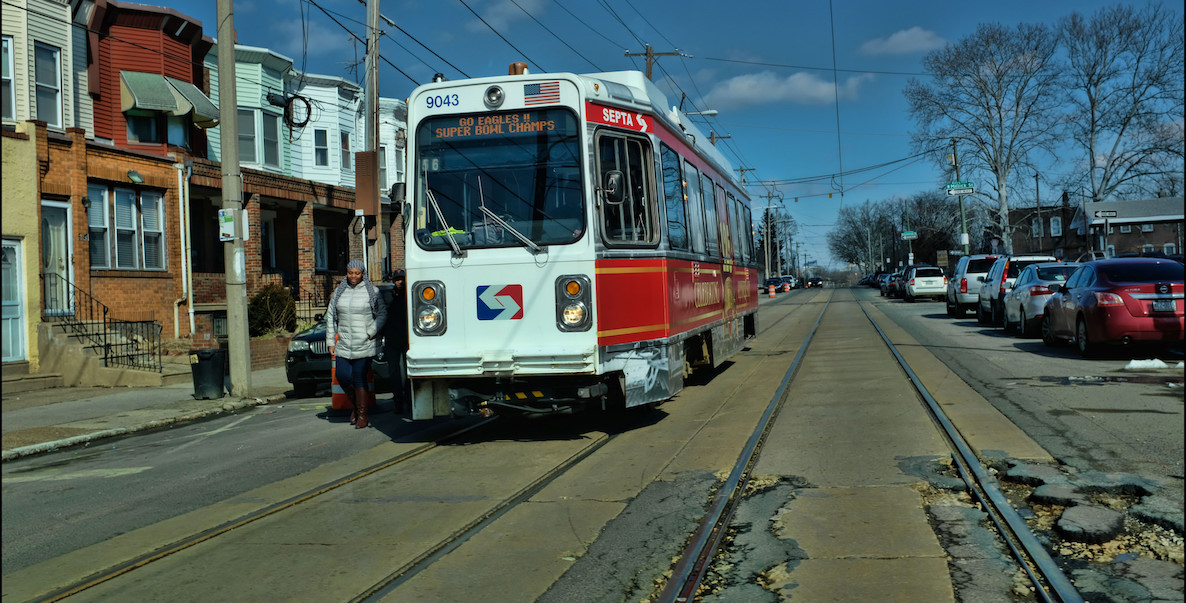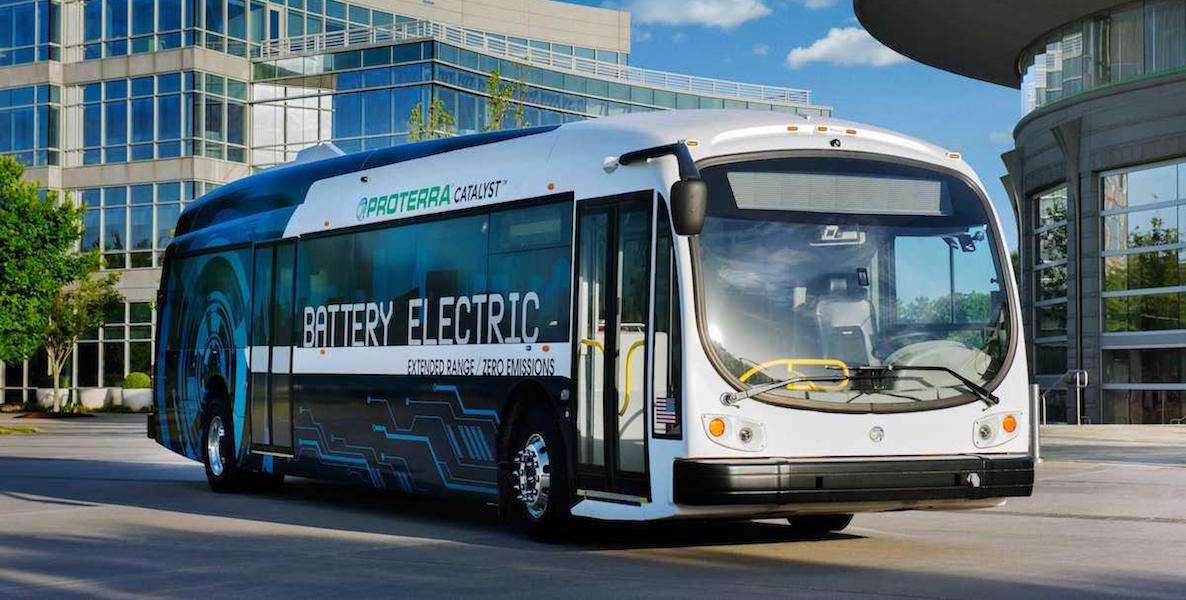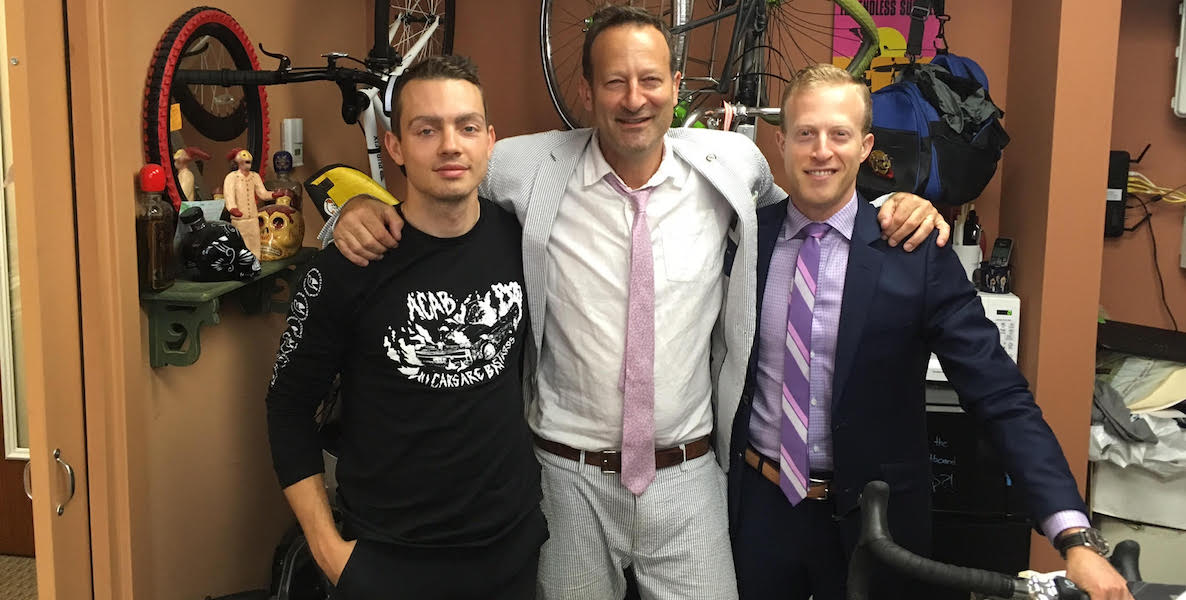Simon Firth knew exactly who to call after an inattentive driver backed out of a parking space at the wrong time, colliding with him and his bike and breaking his wrist. He’d met a lawyer a couple years earlier. It was at some kind of fashion show at a Philadelphia bike expo where most people were decked out in colorful biker regalia.
But not this guy.
“He came in double-fisting tequila bottles,” says Firth, co-owner of Fishtown’s Firth & Wilson Transport Cycles. “He’s a smartly-dressed, suited guy backstage at a bike expo. It’s like, ‘Who the fuck is that?’”
It was Stuart Leon, Philadelphia’s bicycle crash attorney. There’s nobody else like him in the city, possibly the entire country. Leon, 56, and his son, Zach, a 2015 Drexel Law grad, represent cyclists only.
Clients often find out about the practice from leaders in the bicycling community, like Firth.
Some post a long message on Facebook bemoaning a broken bone and damage done to their bike and hear from a friend that they need to “call Stu.” Still others may realize what he does when they see him wearing a charcoal t-shirt emblazoned “Stuart Leon Bicycle Crash Law” during his weekend gig as drummer in the Mas Tequila Orchestra (Zach plays the saxophone). The cover band just played at SugarHouse last week, and they’re the official Margate town band.
“He came in double-fisting tequila bottles,” says Firth, co-owner of Fishtown’s Firth & Wilson Transport Cycles, of Leon. “He’s a smartly-dressed, suited guy backstage at a bike expo. It’s like, ‘Who the f*** is that?’”
The money in bike law isn’t astronomical. There’s a reason Penn Law grads aren’t lining up to join in. But it’s been enough for Leon and his son, given Philly’s steady stream of bike crashes. And lately the cases have been particularly frustrating. Leon represents the families of Emily Fredericks, the 24-year-old killed by a truck driver last November while riding in the bike lane on Spruce Street, and Pablo Avendano, the 34-year-old Caviar deliverer killed last month.
Both their crashes occurred in bike lanes. That’s something that’s bothered Leon, and for years he’s wanted to improve and expand lanes throughout the city. And now he might’ve found a solution.
City Council has given itself final say over where to install bike lanes, a setup that might actually be against state law. Using a crash on Washington Avenue as the test case, Leon recently filed a lawsuit that could remove the politics.
“It doesn’t look like the lawsuit that’s going to change Philadelphia,” Leon says, “but my goal is that it will be.”

The first person to greet clients inside Leon’s Center City office is Dillon Mast. He’s wearing form-fitting biker shorts during my visit and a black shirt that includes the word “bastard” on it. In the middle of the office, a poster of James Dean’s “Boulevard of Broken Dreams” hangs on the wall, near a mirror surrounded by a colorful bike tire.
There’s no fresh coffee pot to be found. Leon, wearing a light gray suit with a pink tie and a watch with a velcro band, tries to allay the situation by offering to pour half the Starbucks cup he’s holding in his hand into another mug for me (I declined).
Leon represents the families of Emily Fredericks, the 24-year-old killed by a truck driver last November while riding in the bike lane on Spruce Street, and Pablo Avendano, the 34-year-old Caviar deliverer killed last month.
The closest any of his decor gets to a traditional law office might be a poster with a Pennsylvania statute written on it, Motor Vehicle Code 3705, the door law. It states that in Pennsylvania, “no person shall open any door on a motor vehicle unless and until it is reasonably safe to do so and can be done without interfering with the movement in other traffic.”
“We file a lawsuit with that law,” Zach says, “and we win every time.”
“I’ve won more door cases,” Leon continues, “than anybody in the world. No doubt. I’ve been doing them year in, year out. Door, door, door, door. I would love for the police to know that law.”
For many years, Leon’s practice resembled something closer to the typical personal injury attorney, representing people who’d been injured in a wide range of accidents. He rode often and soon started advocating for friends who’d been hurt in bike crashes. It started to dawn on him he was spending the vast majority of his time on bicycle crash victims. So about 12 years ago Leon blocked off the rest of his practice and focused solely on bikes. Zach officially joined the practice in 2015, but he had been assisting his father since 2005 and sharing his father’s interest in the law for even longer.
“I would take him to laundromat triple murders when he had the day off school,” Leon says. “We enjoy trials. We really do.”
Leon represented the Bicycle Coalition in its early days and would get the occasional big case that would be written about in the Inquirer or featured on 6ABC. But mostly he found himself representing clients who didn’t realize they had a case. They’d get into a crash, require an emergency room visit, sustaina broken bone or deep cuts and then argue with unwilling insurance c Tell City Council To Back Off Bike LanesDo Something
“It just doesn’t look like money,” Leon says. “To us that’s not part of the formula.”
Sometimes the clients come to him because nobody believes them. Emily Sung, a choral director who lives in West Philly, was biking into Center City for work one day in 2015 in the Spruce Street bike lane. She started passing through the 34th Street intersection, next to the Penn Hospital, when a dump truck started turning right and cutting her off. She couldn’t break in time. Sung slid off her bike under the truck. As the wheels passed by she managed to tuck and roll between two of them. She could hear the passersby screaming as the truck narrowly missed crushing her.
Sung left with minimal injuries. Two Penn Public Safety Department officers interviewed her, filing two reports. Neither referred to it as an accident, and Sung couldn’t even get the information about the truck from the Penn police department. After an acquaintance recommended Leon after seeing her post about crash on Facebook, she hired him and ended up getting a settlement.
“I was really pleased to find the resources he gave but kind of disheartened there’s a reason for him to exist in the first place,” Sung said.
Sung, 29, had been an avid cyclist since her high school days. She hasn’t biked since the accident.
“Maybe down the block,” she says. “I tried to go mail a letter, and it was very stressful so I basically stopped.”

With more than 400 miles of bike lanes, among the most in the country, more bicycle commuters per capita than any of the nation’s 10 biggest cities and a thriving lobbying arm in the Greater Philadelphia Bicycle Coalition, Philadelphia has the backbone of a great biking city. But something else separates Philly from every other city in the country.
In 2012, City Council passed a law requiring Council to sign off on any bike lane that results in the loss of a traffic or parking lane. It’s a Councilmanic Prerogative for biking. Nothing gets done unless Council agrees, and Council could deny a lane for any political reason. According to Next City, not one other American city has a similar law.
Bike lanes help attract new riders for safety reasons, and protected bike lanes are even better. But Council’s added layer of bureaucracy and politics make the lanes much more difficult to come by. And it could get even tougher. Councilwoman Jannie Blackwell, who last year tried to turn a permanent addition of a protected bike lane on Chestnut Street in West Philly into a pilot program, introduced a bill earlier this year to strengthen the 2012 legislation. It would require an ordinance for any modification to a bike lane that alters traffic.
So Council wants more power. Nearly everyone else would like to see it with less. Leon thinks he knows how to make that happen.
Leon’s suit suggests the state’s authority on traffic matters preempts Council and should nullify its power. According to state law, the city must adhere to engineering standards. While City Council relies on studies and testimony from professionals, City Council members aren’t experts. This is where Leon sees an opening.
On May 21, he filed a lawsuit against the city regarding a graduate student injured in a bicycle crash on Washington Avenue, just east of Broad. The student was riding in a sharrow lane last fall when he was forced into the street because of construction and hit by an Uber driver.
Years ago, a study found out that crashes occurred on the same stretch of Washington Avenue six times a week. The City Planning Commission recommended changing the structure of the street to one traffic lane on each side, sandwiching a turn lane. Bike lanes would be on the outside of the traffic lane and, according to the suit, would not have been affected by the construction.
The suit blames the city for not taking action and suggests the state’s authority on traffic matters preempts Council and should nullify its power. According to state law, cities of the first class (Philly being the only one) can install traffic control devices, which would include bike lanes, without state approval. But the city must adhere to engineering standards. While City Council relies on studies and testimony from professionals, City Council members aren’t experts. This is where Leon sees an opening.
“Our goal is to establish this victim was hit by an Uber and has standing to sue the city for a dangerous and defective highway that was created as a result of City Council’s exercise of authority that they don’t rightfully have,” he says.
Regardless of Blackwell’s bill, Leon has even heard City Council would prefer to give up its bike lane duty. The last few months have brought some of the most terrifying accidents in recent memory, including the fatal crashes involving Fredericks and Avendano in bike lanes. “It’s become a such a white hot, no win situation for them,” Leon says.

On a Monday afternoon in City Council, the crowd is getting restless. A dozen or so people are ready to share testimony about why they believe the bike lanes on Spruce and Pine should be shifted from the right side to the left side of the streets, and they’ve had to wait through a previous hearing that went long and then earlier discussions from Council’s Streets and Services committee. Finally it’s time, and a few signs pop up in the gallery.
Zach Leon is holding one of them. It’s a photo collage of Fredericks. Her family is Stories from Mark DentRead More
“I saw them look over a couple of times,” he says, “so I think it worked.”
Leon introduces the first speaker, a client whose foot was severely damaged when she was run over by a car while biking on Spruce Street. When he hears about major crashes, he enlists another employee, Matt Kendig, to put up signsand find witnesses. Even with other people who see something bad happen, it can be difficult to convince an injured cyclist their damages matter.
For cyclists, often distrustful of law that seems tilted toward drivers, the discovery of Leon is a relief.
“He passes through walls that people who identify as outsiders don’t feel they can pass through effortlessly,” says David Commins, a former Leon client and editor of The Philadelphia Secret Admirer. “That knowledge, that comfort, that somebody who does know what’s up is invaluable.”
It always helps that Leon relates with those outsiders. The second time Commins met in Leon’s office he wore a cut-off sleeveless shirt and was sweating from a bike ride. Leon asked Commins why he had come to meet with a lawyer in that kind of garb.
“He said, ‘I heard it would be fine with you,’” Leon recalls. “And I said, ‘Good. I’m glad to hear that answer.’”






